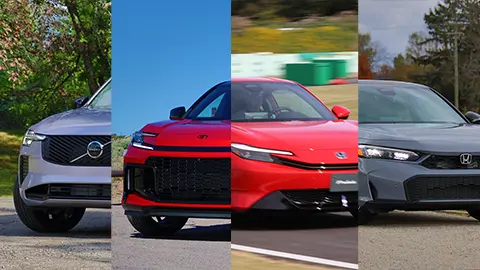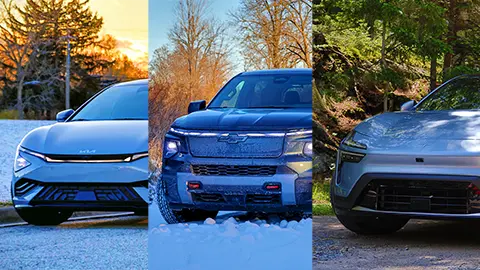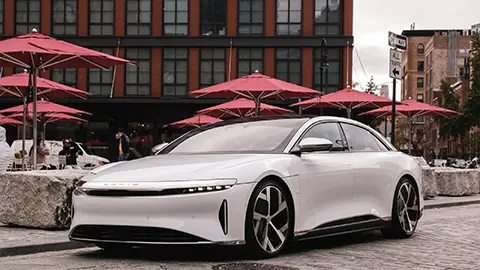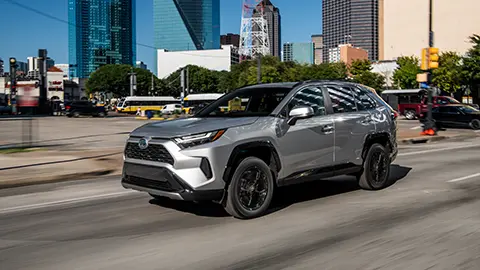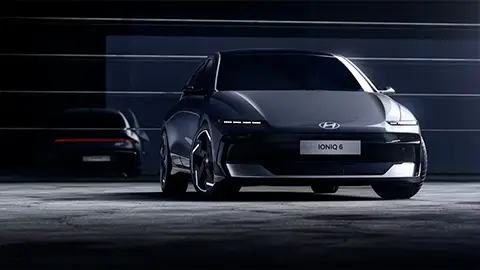Electric Cars: Concerns About Charging
While the number of electric cars available to Americans is greater than ever, research like J.D. Power’s recent Electric Vehicle Consideration study show that consideration isn’t keeping up with the greater number of choices. Buyers continue to be concerned about charging; while most EV drivers will charge at home most of the time, nobody wants to be inconvenienced on long trips. Despite ever-improving infrastructure, EVs still take longer to charge than a gasoline car takes to refuel. Now, a study from P3, a technology and efficiency consultancy based in Germany, has attempted to rank which EVs offer the fastest charging – and thus the most convenience for long distance driving.
Which Electric Cars Charge the Fastest?
P3’s latest EV Charging Index study, focused in 2023 on the North American market, quantifies the charging speed of various electric car models to show just how much range they gain on a Level 3 DC fast charger over a 20-minute time period.
Why 20 minutes? The analysts argue that 20 minutes is a better metric than trying to time a full charge, as charging speeds drop off significantly as the battery reaches full capacity. On the road, EV drivers are unlikely to want to wait to achieve a full charge; on the other hand, 20 minutes for most vehicles allows them to gain a significant amount of range in the time it takes to take a quick bathroom break and grab a cup of coffee. Indeed, grabbing a 20 minute charge when the electric car is almost “empty” and stopping more frequently may often be the more time-efficient way to travel.
Because charging speeds vary with the state of charge of the battery itself, P3 Group used a 10 percent state of charge as the baseline for its charging times – allowing each vehicle to reach its theoretical maximum charging speed. The company then measured how much extra range was added over the first 10 minutes, and then over the second 10 minutes, as charging speeds would drop off as the battery filled up.


Fastest-Charging EV: Lucid Air
In P3’s testing, the fastest-charging electric car was the Lucid Air Grand Touring, a high-end luxury sedan, which added a total of 208 miles of extra range in 20 minutes of charging. It was followed by the equally high-end Tesla Model S Plaid, which achieved 193 miles of range added in 20 minutes. Rounding out the top 10 were the Kia EV6, Tesla Model 3, Tesla Model Y, Porsche Taycan GTS, BMW iX, Polestar 2, Volkswagen ID.4, and BMW i4.
The full list of vehicles tested is below.
- Lucid Air Grand Touring, 208 miles added
- Tesla Model S Plaid, 193 miles added
- Kia EV6 LR RWD, 191 miles added
- Tesla Model 3 LR AWD, 169 miles added
- Tesla Model Y RWD, 161 miles added
- Porsche Taycan GTS, 153 miles added
- BMW iX xDrive50, 136 miles added
- Polestar 2 LR SM, 132 miles added
- Volkswagen ID.4 Pro, 129 miles added
- BMW i4 eDrive40, 125 miles added
- Rivian R1T, 110 miles added
- Ford Mustang Mach-E, 110 miles added
- Ford F-150 Lightning, 109 miles added
P3 Group says that charging performance was measured at stations on the same network provider in California, which offers a maximum charging speed of 350 kW; Tesla models were charged on that company’s own Supercharger V3 stations.

EV Fast Charging: Other Factors
The testing conducted by P3 Group unearthed some other interesting findings. The primary one is that the maximum advertised charging speed of any electric car is only achieved for a few minutes during any given charging station – often when the battery is almost empty. A number of outside factors can also influence charging speed, including ambient temperature and available power at the charging station; if multiple EVs are fast-charging at once, power output can be reduced.
Of the vehicles tested, the Porsche Taycan GTS averaged had the highest average charging power until hitting about 50 percent charge, after which charging speed dropped off precipitously; the Kia EV6 exhibited similar behavior, though at lower average speeds. The Polestar 2 had the most gentle drop-off of charging speed.
The Porsche Taycan and Lucid Air also achieved the highest peak power; both vehicles reached 270 kW thanks to their 800-volt architecture. The Taycan, however, had a higher average charging power of 223 kW. The Tesla Model S Plaid runs a 400-volt architecture, but still showed peak power of 251 kW – very impressive – and an average charging power of 168 kW between 10 and 80 percent.
Of the trucks tested, the Rivian R1T and Ford F-150 Lightning were almost tied for average charging power, at 150 kW for the Rivian and 148 kW for the Ford between 10 and 80 percent. The Rivian, however, maintained its peak charging speed of about 200 kW for longer, making it more convenient for drivers.
Which EV is Best for Long Distance Driving?
P3 Group notes that it’s not just charging speed and the size of the battery that you should consider if they will frequently take long drives in their electric car. Overall efficiency is an equally important factor – the more efficient a vehicle is, the further it will go with every percent of charge. On that front, the Lucid Air was the clear winner, with an EPA estimate of 26.0 kWh/100 miles – significantly better than the Porsche Taycan’s 41.0 kWh/100 mile EPA estimate. Combine its improved efficiency with a larger battery (112 kWh instead of 83.7 kWh) and the Air can go much further between fast charges.







